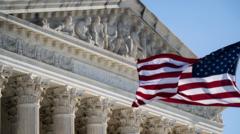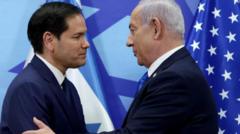**As King Abdullah II prepares for a meeting with President Trump, he navigates competing pressures: accept refugees from Gaza under U.S. demands or risk vital aid pipelines amid a complex local demographic landscape.**
**King Abdullah II's Diplomatic Dilemma amid Trump’s Controversial Proposal**

**King Abdullah II's Diplomatic Dilemma amid Trump’s Controversial Proposal**
**Jordan’s king faces pressure from Trump on Palestinian refugee acceptance while balancing domestic political realities.**
King Abdullah II of Jordan is set to have a crucial meeting with President Trump, who is intensifying his efforts to reshape U.S. foreign policy in the Middle East, particularly concerning the ongoing Palestinian crisis. President Trump has proposed that Jordan and Egypt accept approximately 1.9 million Palestinians from the Gaza Strip, a measure that would signal a significant shift in regional refugee policy.
In a previous encounter between King Abdullah and President Biden, the king was regarded as a key ally in U.S. Middle Eastern strategy, described as operating in a "tough neighborhood." However, as Trump resumes command of U.S. foreign policy, the political landscape has shifted, leading to added complexities in Jordanian domestic and foreign affairs.
Trump’s recent remarks about potentially cutting aid to Jordan and Egypt for not complying with his plan add a layer of urgency to the situation. Jordan relies heavily on U.S. aid, with financial support exceeding $1.5 billion annually. Any threat to this funding could destabilize Jordan, a nation that already contends with economic difficulties and a large population of Palestinian descent, which accounts for over half of its 12 million citizens.
Experts argue that King Abdullah’s ability to maintain his rule may depend on how he responds to Trump's demands. Accepting a large influx of Palestinians could resonate negatively among his populace, many of whom identify as or have strong ties to Palestinian communities. Rejecting Trump's proposition, however, poses risks to Jordan's continued foreign assistance, thus placing King Abdullah in a precarious position as he navigates the demands of a powerful ally while remaining sensitive to his own people's sentiments.
This looming diplomatic challenge could have broader implications for the geopolitical landscape in the Middle East, especially in the context of ongoing conflicts and shifting alliances. How King Abdullah II addresses Trump's controversial proposal will likely influence not only Jordan's relationship with the U.S. but also the stability of his own reign and the dynamics of Palestinian displacement in the region.




















